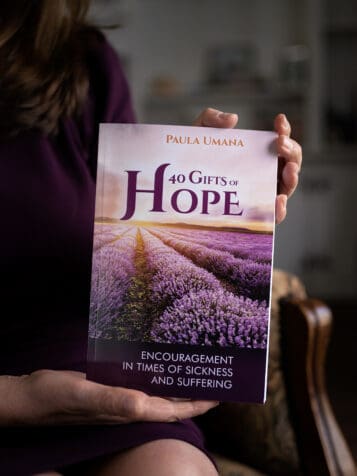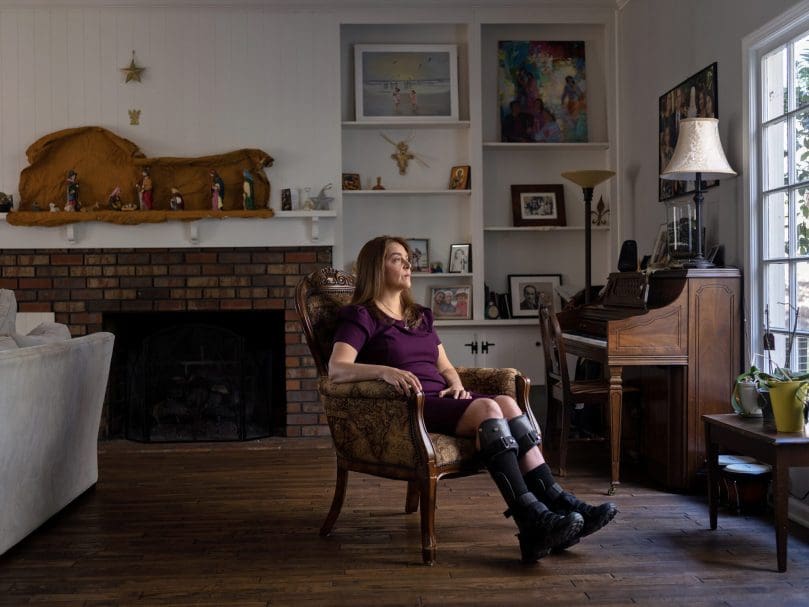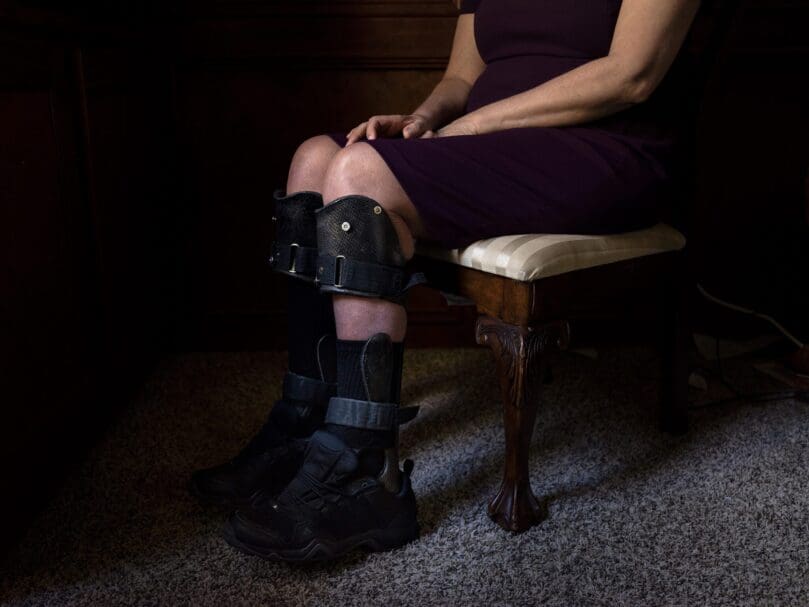Author Paula Umana photographed at her home in Marietta. Diagnosed seven years ago with a paralyzing neurological disorder, she offers others hope in a new book. Photo by Johnathon Kelso
Atlanta
Atlanta Catholic transforms personal suffering into hope
By NICHOLE GOLDEN, Editor | Published March 21, 2022 | En Español
ATLANTA—The meaning of suffering is something Paula Umana has contemplated often since her diagnosis with a paralyzing neurological disorder seven years ago.
While pregnant with her fifth child, Umana began to notice weakness in limbs. She recalls losing grasp on items. Bottles fell unexplainably from her hands.
Her son, Charles, was born in December 2014. In February 2015, she became terrified one evening as she tried to get out of bed but couldn’t walk to the bathroom. By July of 2015, Umana’s symptoms had progressed.
“It was like a monster in my body,” she said. “I was a completely paralyzed person. I was not able to feel my legs.”
The diagnosis was chronic inflammatory demyelinating polyneuropathy or CIDP, which left her a quadriplegic. The disorder is rare and caused by damage to myelin, the covering of the nerves.
Umana was ranked the number one professional tennis player in Costa Rica and Central America in the 1990s. She was a busy mom and tennis coach, raising a family in Atlanta with her husband, Serge Sautre.
The diagnosis and hospital stays left her wondering how she would continue to be part of her four daughters’ lives and care for her infant son.
She began to suffer emotionally when unable to help her daughters with simple tasks. A visiting priest from Puerto Rico introduced her to the idea of offering suffering to God for other people’s situations. Umana began to take the petitions and photos of people and pray for them whenever she was troubled.
During an August 2015 pilgrimage to the Basilica of Our Lady of Los Angeles, more than 40 family members prayed for her. The next day she was able to sit up for the first time and make use of a wheelchair.
Umana founded a tennis academy and kept it going.
“I became the coach from the wheelchair,” she said. “I remember signing checks with my mouth.”
Being open to others God had put in her path helped Umana learn about special leg devices and immunoglobulin infusions. The same day her daughter was praying in Lourdes, France, a stranger named Angel approached Umana in a Publix store in Atlanta to show her special leg braces called ExoSym. She learned about the infusions at a support group for CIDP patients.

Author Paula Umana holds her book, “40 Gifts of Hope: Encouragement in Times of Sickness and Suffering.” Photo by Johnathon Kelso
Both helped her have better mobility, and her paralysis is now limited to her lower legs. She uses a scooter on the tennis court to instruct her students.
The support and encouragement of her husband and children also helped Umana find strength. Umana and her husband celebrated 20 years of marriage in February.
“He was very focused on the plan and what we were going to do,” she said.
Amid her moments of pain and frustration, Umana began to experience a desire to write a book.
“The Holy Spirit helped me,” she said.
In the self-published book, “40 Gifts of Hope,” Umana shares short vignettes of other people’s stories of suffering from blindness, cancer, mental health problems and other situations.
She met people and listened to them. “I spent between two and four hours with each person,” said Umana.
Writing the book was a three-year process for Umana. It is available in Spanish, “40 Regalos De Esperanza.”
“The ultimate goal of the book is to bring salvation,” said Umana.
She also incorporated stories that appeal to non-believers to encourage them in areas such as finding emotional support and about the importance of optimism. After each of the 40 stories, the author shares an activity or reflection. “40 Gifts of Hope” also includes reflections from her own journey.
“It’s encouraging for any person,” she said.
Among the stories are those of Vivian, who was the caretaker for her injured husband, and Pipo, whom Umana helped prepare spiritually for death. An Atlanta priest shares a narrative about the intercession of St. Joseph in his health struggles.
Umana’s family worships at Holy Spirit Church in Atlanta and St. Francis de Sales Church, Mableton. She also spends time speaking to Catholic groups about her journey.
“When illness or affliction affects us, we tend to fill ourselves with physical, spiritual and emotional limitations,” wrote Umana. “After my experience, I can say that there will always be a way to cope with or overcome our health and life challenges. Where there is a will, everything is possible with God.”
Editor’s Note: “40 Gifts of Hope” may be found at Amazon, the book store at Emory Saint Joseph’s Hospital in Atlanta and the Catholic section of the book store of the Episcopal Cathedral of St. Philip in Atlanta.

